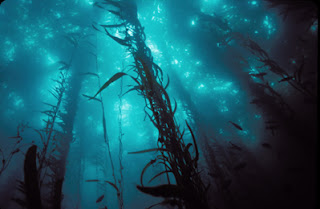 After 5 years of fishing closures, there are more fish in the ocean around Southern California's Channel Islands. Not only that, but fishing has not suffered. Recreational fishing trips have increased, and commercial catches of most large species increased. Whattya know, marine reserves work!
After 5 years of fishing closures, there are more fish in the ocean around Southern California's Channel Islands. Not only that, but fishing has not suffered. Recreational fishing trips have increased, and commercial catches of most large species increased. Whattya know, marine reserves work! OK, it's time for an experiment. Who was right? The people who said fish and fishermen would benefit from ending fishing in selected areas? Or the people who said that closed areas would hurt fishermen without producing benefits?
Answer: conservationists were right when we said some areas should be closed to fishing, that the closures would benefit fish and people.
Will the opponents of fishing closures admit that research shows the benefits of fishing closures? Apparently not, according to this article in the Ventura County Star:
Joel Greenberg, the Southern California chairman of the Recreational Fishing Alliance, said he's not sold on the idea that the reserves are working.I wonder what it'll take to convince the proponents of the so-called "freedom to fish" campaign that opposes fishing closures and sees a conspiracy behind protection proposals. Tweet
7 comments:
I got to go diving off San Miguel this summer and totally subjectively, IT ROCKED. Made poor San Diego look pretty depapaurate. Nonetheless, I'm a bit skeptical of declaring MPA success based on only 5 years of data. Comparing 2003-2007 to 1999 isn't entirely fair, what with the enormous 1998 El Nino. But maybe I'm reading the writeup of the PISCO report incorrectly - I haven't read the original report yet.
Miriam, you should check out the larger studies on sheephead in Ecological Applications, which you'll have access to as a grad student (sorry, general public). The Hamilton et al paper should be out soon too (that includes much of the PISCO data). I've been waiting to do an all sheephead post until that's online.
Thanks, Kate! I'll definitely check both of those out. (& eagerly await your sheephead post).
I'm always curious to see how much the skepticism comes from honestly not believing the data versus bad interpersonal interactions with those presenting and interpreting the data. That was certainly the case when looking at the story of pike in Lake Davis (n.b. link is to a documentary I worked on). I would not be surprised if that is what is happening here, too. Oy, culture clash.
(I also say this as a scientist who admits that he would probably be horrible at finessing those finer points of these sorts of arguments, although it's something I try to work on. Kudos to those in the trenches!)
Honest skepticism of research details is sensible, but the big picture here is clear.
The fishing disaster predicted by some fishermen didn't happen, and the fish recovery predicted by conservationists does seem to be happening.
It will be interesting to see how everyone responds.
Just as importantly, are these fish from the MPA adding to stocks outside the MPA? If you are effectively protecting an important nursery that produces emigrants outside of the MPA, then the fishermen will be happy AND the conservationists right, a win-win.
Just as importantly, are these fish from the MPA adding to stocks outside the MPA? If you are effectively protecting an important nursery that produces emigrants outside of the MPA, then the fishermen will be happy AND the conservationists right, a win-win.
Post a Comment